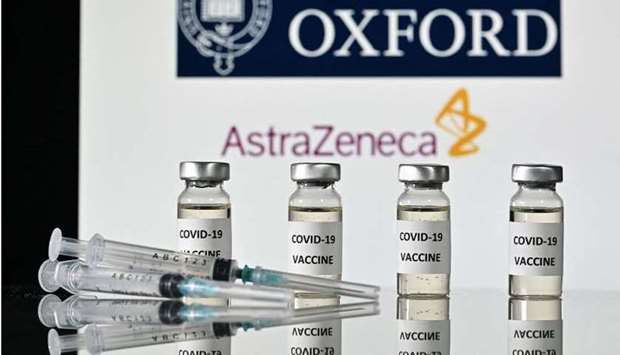Europe’s stuttering coronavirus (Covid-19) vaccine rollout faced multiple hurdles yesterday as EU regulators said they were reviewing side effects of the Johnson & Johnson shot and France further limited its use of the AstraZeneca jab.
Much of the world is still in the clutches of the pandemic that has killed 2.9mn people, from Brazil, where the virus is killing more than 4,000 people a day, to Japan where the government has tightened restrictions once again.
India is also suffering, and hotspot Maharashtra state is running out of vaccines as the health system buckles under the weight of the contagion.
And across Europe populations are facing some of the world’s toughest anti-virus measures, yet the epidemic refuses to be curbed.
All of France is subjected to restrictions of some form, and the country has so far doled out jabs to more than 10mn people.
But it has repeatedly changed the rules on AstraZeneca’s vaccine, first over doubts about its efficacy, then over fears that it could be linked to blood clots.
Yesterday it did so again, with Health Minister Olivier Veran saying that citizens under 55 who had been given a first shot with AstraZeneca would be given a different vaccine for their second dose.
But shortly after he spoke, the World Health Organisation (WHO) said there was “no adequate data” to support switching Covid-19 vaccines between doses.
As Europe continues to reel from constant rows over AstraZeneca’s jab, the EU’s medicine regulator announced that it would be probing a second jab over blood-clot concerns.
The European Medicines Agency (EMA) said four “serious cases” of unusual blood clots had been reported – one of them fatal – with the Johnson & Johnson vaccine, which uses similar technology to the AstraZeneca one.
Johnson & Johnson (J&J) released a statement saying the company was aware that “thromboembolic events ... have been reported with all Covid-19 vaccines”.
But the statement added that “at present, no clear causal relationship has been established between these rare events and the Janssen Covid-19 vaccine”, referring to J&J’s European subsidiary.
Both jabs are approved for use in the European Union but the J&J vaccine has not yet been rolled out, and various EU countries have stopped or limited the use of AstraZeneca.
Supply problem are also hampering vaccine rollouts.
India, which is one of the world’s leading manufacturers of vaccines, is suffering its own problems with jabs in Maharashtra, home to more than 100mn people and the economic hub Mumbai.
In the United States, deliveries of the Johnson & Johnson coronavirus vaccine are set to drop off sharply next week, US health authorities warned yesterday.
Meanwhile, Pfizer-BioNTech asked for authorisation to use their Covid-19 vaccine on 12- to 15-year olds in the US.
The companies said in a statement that they are planning to make similar requests of other regulatory authorities worldwide in the coming days.
In Europe, an AstraZeneca spokesman said half of its vaccine shipments to the EU will be delayed this week.
Germany’s central government has tried hard to defeat the virus through restrictions on movement and commerce, but several states have torpedoed the strategy by refusing to go along with the proposals.
Now Berlin is changing the rules to gather more centralised power.
The proposed adjustments are likely to usher in night-time curfews and some school closures in especially hard-hit areas.
Japan has also tightened measures in the capital Tokyo and other areas, mostly calling for bars to close early.
On the other hand, Italy is set to end lockdown measures from next week for Lombardy, the epicentre of its coronavirus pandemic, and several other regions with improving contagion statistics.
Neighbouring Slovenia also announced it will ease coronavirus restrictions and suspend a six-month-long curfew starting on Monday.
And in badly-hit Brazil, the Senate said it will open an inquiry into the government’s handling of the coronavirus pandemic, as President Jair Bolsonaro continues to resist lockdown measures even with Covid-19 deaths at new records.
Norway’s Prime Minister Erna Solberg was fined 20,000 Norwegian kroner (about $2,300) yesterday for organising a rule-busting family dinner that she ended up not attending.
“Even if the law is equal for everyone, everyone is not equal,” Commissioner Ole Saeverud told a press conference.

Oxford-AstraZeneca vaccine
